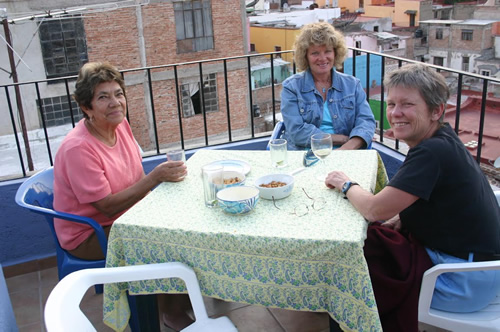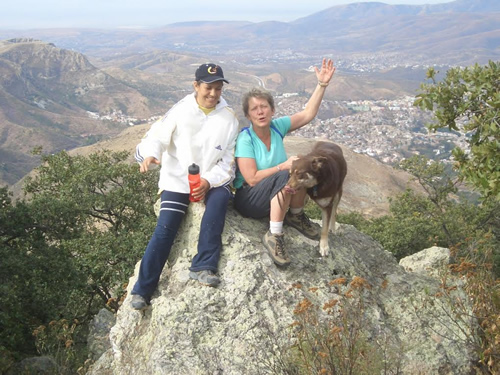Breaking the Gringo Ceiling
Living in Mexico and Making Friends as an Expat
By Louisa Rogers
Published 12/13/2014
 |
| Evening view of Guanajuato. Photo by Barry Evans. |
When my husband Barry and I bought a house in the old colonial city of Guanajuato, in Mexico’s Central Highlands, I knew I wanted to make Mexican friends and not spend all my time with gringos. I have nothing against expats (after all, I am one); it’s just that I didn’t move to Mexico to be with Americans.
Of course I have English-speaking friends, and sometimes there’s nothing better than sharing what’s up — in English! — with my close friends from Oregon or Alberta. However, if I didn’t have Mexican friends, I’m not sure I’d keep living in Mexico.
As an extrovert who’s comfortable in Spanish, I figured making local friends would be straightforward, but after a few months I realized it wasn’t that simple. For one thing, most Mexican women my age (now 62) are amas de casa (housewives) and grandmothers, and don’t circulate much. Secondly, Barry, and I don’t live in Guanajuato full-time. We’re there roughly four months a year. Now, 10 years after we bought our house, I have several strong Mexican friendships that have endured. Here’s how they developed.
Laura
Barry and I laughingly say we have “paid friends” — our Spanish teachers who over time become pals. Our current tutor, Laura, is a divorcee who lives with her mom. She has two sons in their 20s; the younger one lives with her, the older with her ex in Guadalajara. We see Laura about twice a week. She is a very thorough, helpful teacher, plus a great listener and all-round buena persona. Over Spanish, we share our lives. I know that her mother is at loose ends since she lost her job; I hear about Laura’s other students from the U.S., Canada, Japan and Europe. I consult with her when I face tricky cultural situations.
Rebeca
When Barry and I first discovered Guanajuato, we stayed with Rebeca, a home-stay host, while studying Spanish — never imagining that one day we’d be neighbors. She lives up the street from us with her adult son and rents rooms to local and international students. I visit with her, usually over her kitchen table, drinking Nescafe, hearing stories about her family life. Like most Mexican families, Rebeca’s family members live near each other and stay very involved in each other's lives — what some Americans might consider overly involved.
 |
| Rebeca and Diana, with the author on the right, on her terrace. |
Mari
Our friend Mari is a 45-year-old mom, a house cleaner, and — rare among mexicanas — a passionate hiker. She has an unusually independent relationship with her husband, a waiter at one of the high-end restaurants on the Jardin, Guanajuato’s main plaza. He doesn’t complain when she’s off with us rambling outside of town, or even when just she and Barry occasionally hike together. We explore the semi-desert hills above Guanajuato a couple of times a week. The first time I hiked with Mari, she took me a back way to La Bufa, Guanajuato’s landmark, a rock promontory above town. “Es mio!” (“It’s mine!”) she exulted, her face shining, as we took in the huge range above us. If Mari were not a hiker, I doubt we’d be friends. Her Spanish is not easy to understand, perhaps because she didn’t finish high school. However, we share the language of hiking, which gives the three of us a deep bond. Although Mari is twenty years younger than I, our age difference is no barrier to our friendship.
 |
| Mari and the author, along with Luci the dog, on top of Cruz Azul. |
Silvia
I met Silvia in our morning meditation group, led by a Japanese man who has lived in Guanajuato since the 1980s. As we were walking out one day, I asked her if she’d like to have coffee. A student of advanced English at the University of Guanajuato, Silvia’s written English is better than her spoken, and, like many Mexicans, she’s a bit timid about speaking. We communicate in a mixture of Spanish and English. Silvia and I have a lot in common. She has no kids of her own, although, like me, she has stepchildren. I felt great sympathy when she told me about her husband’s ordeals with his grown daughter, but also felt comforted, since Barry and I have similar problems. After 10 years in Mexico, I’ve learned that the U.S. has no monopoly on difficult family relationships.
We’re both professional women. While I still work part-time, Silvia recently retired from her career as a senior manager in IMSS, Mexico’s government health care system. She loves to travel, both with and without her husband, and is the director of a local Mexican expat volunteer group that provides mentoring to university scholarship students. I enjoy discussing the organization with her and brainstorming ideas on how to improve it.
Angeles and Carlos
We met Angeles and her husband Carlos at a Thanksgiving dinner a few years ago. When I invited Angeles out for coffee, she informed me that she and Carlos spoke some English and wanted to practice. These days, she and Carlos, Barry and I get together as a foursome about once a week. Barry and I speak Spanish, which they correct; and they speak English, which we correct. Like Barry, Carlos is a former engineer, and they have “engineer language” in common.
Estela
Meanwhile, I have an incipient friendship developing with Estela, a single retiree also from our meditation group. Estela, like several of my other Mexican friends, has values I share: she’s an independent woman, non-traditional, educated, professional, and interested in travel. This year, she flew to Colombia, where she met with a group of friends from across Latin America with whom she went to graduate school. The group travels together once a year. The last time Estela and I had coffee, we had a lively conversation about our meditation group. We were in stitches, laughing at the peculiar fact that you can get to know personality styles and idiosyncrasies in a meditation group very easily, even (maybe especially) when you only interact with them in silence.
When Barry and I bought our house 10 years ago, I thought my ability to speak Spanish would be the most important factor in making friends. I no longer think that. Spanish helps, of course — both to communicate, and just as important, to show respect. But other factors count for more. Since I’m the outsider, and the one who comes and goes, it is understandable that have to take the initiative, repeatedly. Nevertheless, there are times that I sometimes tire of instigating. It would be great if some of our local friends would call me. And they do, occasionally. However, for the most part, I still must initiate.
I also have needed to persist, to keep coming back and to show people that I had staying power. Friendships take time. That sounds obvious, but I have an American-style sense of urgency, and strongly desired friends right away!Now that they’re used to my rhythms, my friends know I’ll be back in touch. I email them before arriving, and after settling in, the first thing I do is schedule a class with Laura, a coffee with Silvia, and a hike with Mari. I ring Rebeca’s doorbell. Before long, I feel right at home.
Louisa Rogers is a leadership trainer who also gives seminars on wellness. She leads a bicultural life, dividing her time between Eureka, California and Guanajuato, Mexico. Her articles have been published in numerous national publications, including Yoga Journal, Entrepreneur, Glamour, Weight Watchers Magazine, and The Los Angeles Times.
Barry Evans writes a weekly science column.
|
